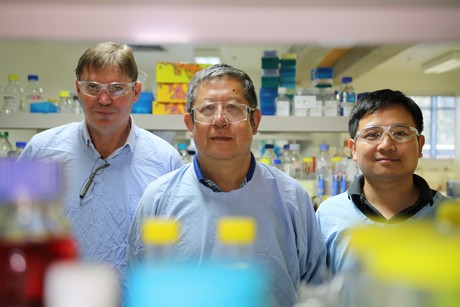'Non-functioning' genes play their part in cancer research

University of Newcastle scientists have discovered that cancer research does not need to be confined to the 2% of the human genome that makes proteins, revealing new possibilities with genes that were previously thought to be ‘non-functioning’ in cancer cells.
The discovery was made by investigating a special class of genes known as non-coding RNAs (ncRNA), found in the human genome. Led by Professor Xu Dong Zhang, Dr Lei Jin and Dr Rick Thorne, the work could lead to the development of new, more targeted cancer therapies.
The first finding, published in the journal Nature Cell Biology, identified a particular ncRNA molecule responsible for protecting the genome and keeping it intact. Named GUARDIN by the scientists, the molecule helps to stabilise a particular protein involved in DNA repair processes.
“We discovered the protective mechanisms of GUARDIN were two-fold,” said Professor Zhang, lead investigator on the project. “On one hand, it acts like a sponge to absorb harmful molecules. On the other, it functions like a bridge that brings two proteins together to protect the genome.”
By reducing the presence of GUARDIN in the genome, cancer cells were made more vulnerable to common drug therapies that target DNA. As explained by Dr Jin, “For cells to survive they must maintain the integrity of their genome, their DNA. Many cancer treatments actually work through causing DNA damage and we found that depleting GUARDIN significantly enhanced the death of cancer cells caused by DNA-damaging drugs.”
The second finding, published in the Proceedings of the National Academy of Sciences earlier this year, investigated an ncRNA that regulates the metabolism of a cell and subsequently how it gets its energy.
“While normal cells use up oxygen for energy, cancer cells use a process called glycolysis to produce energy, which is essential for its survival,” said Dr Thorne. “We found that ncRNA IDH1-AS1 accelerated the metabolic activity of cancer cells.
“At face value, glycolysis is not a particularly efficient way for cancer cells to make energy but there are other advantages, for example, producing building blocks that enable cell growth.
“Like flicking a switch, we were encouraged that when we blocked IDH1-AS1, the cancer cell growth was also blocked and it began to revert to behave more like normal cells.”
With many times more non-coding genes than coding genes, the findings have unlocked new avenues for research potential that could lead to a substantial increase of advanced and targeted treatment methods.
“Our findings have shown that ncRNA are functional and play a very important role in the regulation of biological processes, both physiological and pathological,” said Professor Zhang. “We have only just touched the surface of how they work in the cell.
“There are currently no treatments anywhere in the world that target ncRNA, so this research presents promising potential for further studies and collaboration with pharmaceutical companies to design deliverable treatments that target these particular molecules.”
argenx and Monash University partner against autoimmune diseases
To advance a pioneering molecule for autoimmune diseases, global immunology company argenx has...
Archer completes potassium sensing alpha prototype
Quantum technology company Archer Materials Limited has developed an early Biochip prototype...
Farm animals and aquaculture cryopreservation partnership announced
Vitrafy Life Sciences Limited has announced that it has entered a 12-month exclusive agreement...



